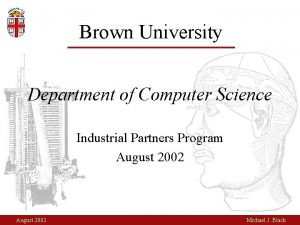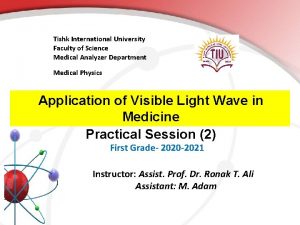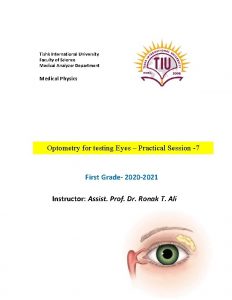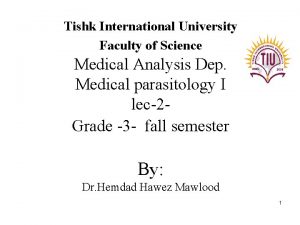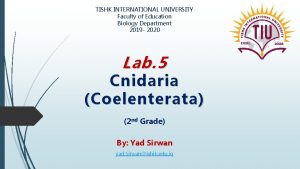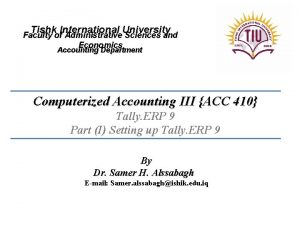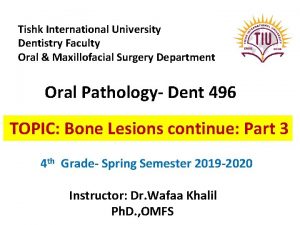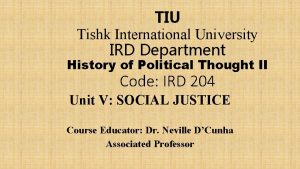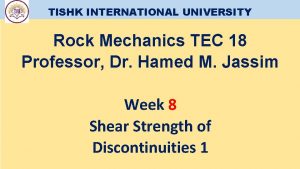Tishk International University Faculty of Science Medical Analyzer


























- Slides: 26

Tishk International University Faculty of Science Medical Analyzer Department Academic debate 4 SKILLS-II First Grade- 2020 -2021 Instructor: Assist. Prof. Dr. Ronak T. Ali


WHAT IS COMMUNICATION? “The imparting or exchanging of information by speaking, writing, or using some other medium. ”

DIFFERENCE BETWEEN HEARING AND LISTENING HEARING LISTENING Passive occurrence Conscious choice With or without your consent Understanding the other person.

CATEGORIES OF LISTENERS Non-Listener • Preoccupied with his personal thoughts and though he hears words, he doesn’t listen to what is being said Passive listeners • Hear the words but don’t fully absorb or understand them. Listeners • Pay attention to the speaker, but grasp only some of the intended message.

PROCESS OF LISTENING • sound enters the eardrums and travels to the brain Hearing Attending • our brain receives the sound and decides what to pay attention to • take what is meaningful and apply it to the social context Understanding Remembering • storing the information for use at a later time

SETH S. HOROWITZ • WHAT IS THE DIFFERENCE BETWEEN HEARING AND LISTENING? ATTENTION

EYE CONTACT Engage Find the “Why” and “What” How to be a good listener? Limit distractions Focus on theother person

GOOD LISTENERS Poor Listeners Mentally evaluates the message and its supporting • details. • Seeks applicable "take away" messages. • Concentrates beyond distractions and speaker • mannerisms. Utilizes several note taking methods. • Reserves judgment until comprehension is complete. • Examines more complex information on a regular • basis. Concentrates beyond words that are heavy in implied • meaning Maintains good eye contact and holds body language • that encourages the speaker. • Judges based on content, not delivery. • Listens for concepts rather than details. • • Wool gathers with slow speakers. • Tunes our with dry topics. • Easily distracted. • Takes many notes, but misses key elements. • Seeks out and enters arguments. • Frustrates when listening to difficult material. • Allows unfamiliar works to break his attention. • Does not actively focus. • Judges the quality of delivery. • Listens for facts.

CATEGORIES OF COMMUNICATI ON

WHAT IS VERBAL COMMUNICATION? Any form of communication involving words, spoken, written or signed. • Our ability to communicate with a language that is based on an organized system • of words, rather than merely sounds, is what sets us apart from lower species. •

WHY IS VERBAL COMMUNICATION IMPORTANT? To infor m To correc ta wrong To clarify

WHY IS NON-VERBAL COMMUNICATION IMPORTANT? To reinforce To emphasize To substitute To contradict To complement

WHAT IS NON-VERBAL COMMUNICATION? GESTURES TOUCH INCLUDE S BODY LANGUAG E POSTURE EYE CONTACT FACIAL EXPRESSIONS

THE LIGHTHOUSE EFFECT

WHAT IS ASSERTIVENESS? “Assertiveness is about self confidence which means having a positive attitude towards yourself and others. ”

WHAT IS ASSERTIVENESS Direct, open & honest communication with others Asking for what you want & saying “no” to what you don’t • want Not negating, attacking or manipulating others Respecting the dignity of other people Standing up for yourself & your rights without apologising • or feeling guilty Taking responsibility for your own needs

ASSERTIVENESS IS NOT Selfish Aggressi ve Passive. Aggressiv e Manipulativ e Even though we do use these “communicative tactics” at some point in our lives to get what we want - But – Spending your life or time being a non- assertive communicator will bring you much stress, dissatisfaction & disappointment.

HOW CAN I BE MORE ASSERTIVE 30% Verb al 70% Non Verbal Voice Tone Gestures Facial Expressio ns Eye Contact Posture “Social Signalling ”

TYPES OF COMMUNICATION Passive Communication • Soft voice • Overly agreeable • Withdrawn body language • Sound unsure • Sound hopeless or helpless Aggressive Communication • Blaming, accusing • Intimidating body language • Demanding, ordering • Raised voice • Harsh, personal language Assertive communication • Takes initiative • Speaks up in a direct and appropriate manner • Shows sincerity • Confident voice and body language • Is solution focused

WHY IS IT DIFFICULT TO SAY NO? They may feel hurt or injected They may not like me anymore They may never ask again They won’t take any notice if I say no They would say ‘yes’ to me (and so I will feel guilty if I refuse them) I can’t say no, because I feel sorry for them

HOW TO SAY ‘NO’ ASSERTIVELY? Start your reply with a clear, firm, audible ‘no’ Do not justify or make excuses. Giving a reason is different from over-apologizing Feel that you have a right to say no Once you have said ‘no’ , do not stay around waiting to be persuaded to change your mind.

WHY IS IT DIFFICULT TO SAY ‘YES’? I don’t deserve it They might not really mean it I am not really sure that is what I want I don’t have enough information

HOW TO SAY ‘YES’ ASSERTIVELY Say ‘yes’ clearly and definitely Identify why you would find it difficult Examine thoughts realistically and ask yourself Having calarified thughts for yourself then reaffirm your desire to say ‘yes

THANK YOU

EVALUATION • DESCRIBE WHAT YOU LEARNT DURING THIS EXPERIENCE THAT WILL BE HELPFUL IN THE REAL WORLD? • WHICH PART OF THE PRESENTATION DID YOU LIKE THE MOST? • WHICH PART DO YOU THINK COULD HAVE BEEN EXPLAINED BETTER? • ANY OTHER OPINIONS/ SUGGESTIONS?
 Masaryk university medical faculty
Masaryk university medical faculty Masaryk university medical faculty
Masaryk university medical faculty University of bridgeport computer science
University of bridgeport computer science University of bridgeport computer science
University of bridgeport computer science Mch fsu
Mch fsu Brown university computer science
Brown university computer science Medical test analyzer software
Medical test analyzer software Medical faculty in novi sad dean
Medical faculty in novi sad dean My favourite subject science
My favourite subject science Herszon kherson maritime college of merchant marine fleet
Herszon kherson maritime college of merchant marine fleet Hubert kairuki memorial university faculty of medicine
Hubert kairuki memorial university faculty of medicine Solid thyroid nodule
Solid thyroid nodule Applied medical sciences
Applied medical sciences Mendel university faculty of business and economics
Mendel university faculty of business and economics Singularity university faculty
Singularity university faculty Territorial matrix vs interterritorial matrix
Territorial matrix vs interterritorial matrix Feup university of porto
Feup university of porto Webkredit cuni
Webkredit cuni Faculty of veterinary medicine cairo university logo
Faculty of veterinary medicine cairo university logo Faculty of law of the university of zagreb
Faculty of law of the university of zagreb University of montenegro faculty of law
University of montenegro faculty of law University of kragujevac faculty of technical sciences
University of kragujevac faculty of technical sciences University of cologne faculty of management
University of cologne faculty of management Leading university tuition fees
Leading university tuition fees Hacettepe university faculty of medicine
Hacettepe university faculty of medicine دانشگاه دامپزشکی تهران
دانشگاه دامپزشکی تهران Semmelweis university faculty of medicine
Semmelweis university faculty of medicine





